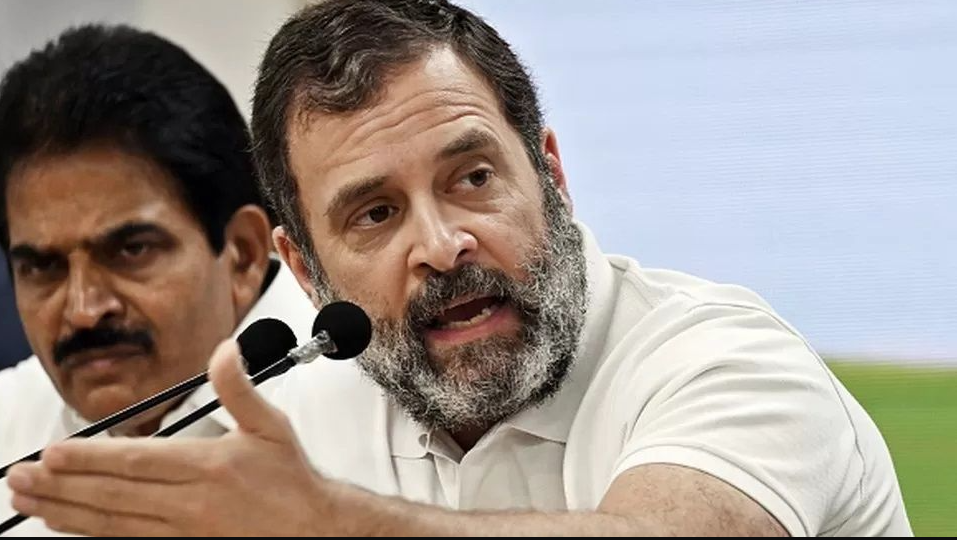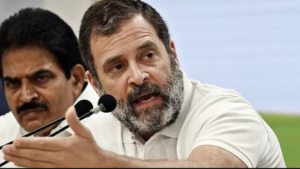
“Rahul Gandhi FIR Ambedkar”
Political Vendetta or Justice? Rahul Gandhi Faces Fresh FIR Amid Ambedkar Row
In an escalating series of political confrontations, Rahul Gandhi, a prominent leader of the Congress party, finds himself at the center of yet another controversy. The recent filing of a First Information Report (FIR) against him, allegedly in connection with remarks on B. R. Ambedkar and a physical altercation in Parliament, has ignited a heated debate on political accountability versus vendetta. This incident not only raises questions about the state of Indian politics but also highlights the growing tensions between the Bharatiya Janata Party (BJP) and the Congress.
Rahul Gandhi

The Incident: A Parliamentary Scuffle
The controversy stems from a scuffle that reportedly took place during a heated parliamentary session. According to sources, the altercation left two BJP Members of Parliament (MPs) injured, leading to accusations against Rahul Gandhi. The BJP has alleged that Gandhi incited violence and committed physical assault, even calling for charges of attempted murder to be included in the FIR.
In response, the Congress has filed a counter-complaint, accusing BJP MPs of misbehavior and assault on Congress President Mallikarjun Kharge. The Congress insists that the BJP’s actions are an attempt to deflect attention from larger issues of governance and caste justice.
Congress Responds: Political Vendetta?
The Congress party has strongly condemned the FIR, calling it a “diversionary tactic” by the BJP. Congress General Secretary KC Venugopal stated, “Rahul Gandhi is already facing 26 FIRs due to BJP’s political vendetta. This is yet another example of how the ruling party misuses government machinery to suppress dissent.”
Venugopal added that such actions are aimed at intimidating Gandhi, who has been vocal in his criticism of the BJP’s policies. He further accused the BJP of attempting to divert public attention from issues such as unemployment, inflation, and caste discrimination.
The Ambedkar Row: A Deeper Context
The current controversy is also tied to remarks allegedly made by Union Home Minister Amit Shah about B. R. Ambedkar, the architect of India’s Constitution. Rahul Gandhi and the Congress have been critical of the BJP’s stance on Ambedkar’s legacy, accusing them of undermining his ideals of social justice and equality. Gandhi’s protest against these remarks is believed to be the underlying reason for the BJP’s aggressive stance against him.
Legal and Political Implications
The FIR against Rahul Gandhi is significant for several reasons:
- Political Fallout: The repeated filing of FIRs against Gandhi and other opposition leaders has fueled allegations of political vendetta, undermining the democratic ethos of India. The Congress has stated that such actions are part of a larger strategy to weaken the opposition.
- Legal Challenges: With multiple FIRs against him, Gandhi faces increasing legal scrutiny, which could hinder his political activities and tarnish his public image. However, the Congress seems determined to frame these legal battles as a badge of honor, portraying Gandhi as a leader undeterred by political pressure.
- Public Perception: While the BJP asserts that the FIRs are based on legitimate grievances, critics argue that these actions appear to be selective and targeted, raising concerns about impartiality in the legal process.
The Role of Media and Public Discourse
This incident has also sparked a broader conversation about the role of media in shaping public opinion. While BJP-aligned outlets have focused on the alleged misconduct of Gandhi, others have highlighted the Congress’s accusations against the BJP. The polarized nature of the coverage reflects the deep divisions within Indian society and politics.
Social media platforms have become battlegrounds for supporters of both parties. Hashtags like #JusticeForAmbedkar and #PoliticalVendetta trend simultaneously, showcasing the conflicting narratives that dominate the public discourse.
A Pattern of Allegations
This is not the first time Rahul Gandhi has faced accusations of wrongdoing. Over the years, he has been entangled in multiple legal battles, ranging from defamation cases to allegations of financial misconduct. However, Congress leaders maintain that these cases are part of a systematic campaign to malign Gandhi’s image and undermine his leadership.
The BJP, on the other hand, insists that Gandhi is not above the law and must face consequences for his actions. This tit-for-tat approach has only deepened the chasm between the two parties, making it harder to achieve bipartisan cooperation on issues of national importance.
Conclusion: A Test for Indian Democracy
The latest FIR against Rahul Gandhi is more than just a legal or political issue—it is a test for India’s democratic institutions. The incident highlights the challenges of balancing accountability with fairness in a highly polarized political environment. For the Congress, it is an opportunity to rally support and frame Gandhi as a resilient leader fighting against an authoritarian regime. For the BJP, it is a chance to reinforce its narrative of law and order while discrediting the opposition.
As the nation watches this drama unfold, one thing is clear: the stakes are high for both parties. How this controversy is resolved will not only impact the political fortunes of Rahul Gandhi and the Congress but also shape the future of India’s democratic landscape.
For More Updates : https://www.trpnewstv.com
| More news available on our new website: n7tv – Stay Informed, Stay Ahead |







